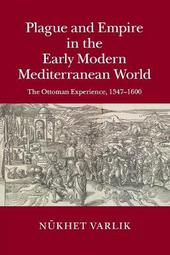
|
Plague and Empire in the Early Modern Mediterranean World: The Ottoman Experience, 1347-1600
Paperback / softback
Main Details
| Title |
Plague and Empire in the Early Modern Mediterranean World: The Ottoman Experience, 1347-1600
|
| Authors and Contributors |
By (author) Nukhet Varlik
|
| Physical Properties |
| Format:Paperback / softback | | Pages:354 | | Dimensions(mm): Height 230,Width 154 |
|
| Category/Genre | Environmentalist thought and ideology |
|---|
| ISBN/Barcode |
9781108412773
|
| Classifications | Dewey:614.57320956 |
|---|
| Audience | | Professional & Vocational | |
|---|
| Illustrations |
Worked examples or Exercises; 5 Maps; 10 Halftones, unspecified; 10 Halftones, black and white
|
|
Publishing Details |
| Publisher |
Cambridge University Press
|
| Imprint |
Cambridge University Press
|
| Publication Date |
10 August 2017 |
| Publication Country |
United Kingdom
|
Description
This is the first systematic scholarly study of the Ottoman experience of plague during the Black Death pandemic and the centuries that followed. Using a wealth of archival and narrative sources, including medical treatises, hagiographies and travellers' accounts, as well as recent scientific research, Nukhet Varlik demonstrates how plague interacted with the environmental, social, and political structures of the Ottoman Empire from the late medieval through the early modern era. The book argues that the empire's growth transformed the epidemiological patterns of plague by bringing diverse ecological zones into interaction and by intensifying the mobilities of exchange among both human and non-human agents. Varlik maintains that persistent plagues elicited new forms of cultural imagination and expression, as well as a new body of knowledge about the disease. In turn, this new consciousness sharpened the Ottoman administrative response to the plague, while contributing to the makings of an early modern state.
Author Biography
Nukhet Varlik is Assistant Professor of History at Rutgers University, Newark. She is the recipient of an NEH Fellowship by the American Research Institute in Turkey, a Senior Fellowship from Koc University's Research Center for Anatolian Civilizations, and a Turkish Cultural Foundation Postdoctoral Fellowship.
Reviews'... a book that tackles and raises major questions about Ottoman history and the hitherto under-studied subject of disease. Much as the subject of plague has been ascribed great importance within the historiography of medieval and early modern Europe, Varlik demonstrates that plague in the Eastern Mediterranean merits consideration as the focal point in the study of the Ottoman Empire and its capital in Istanbul ... Whether continuing the study of diseases and their relationship with a transformation polity or exploring how cats became cuddly co-agents in an Ottoman reaction to repeated epidemics, Ottomanist scholars will return to Plague and Empire in the Early Modern Mediterranean World as an important source of new questions in the years to come.' Chris Gratien, The Journal of Ottoman Studies 'The significant contribution of Nukhet Varlik's monograph is that it places the Ottoman empire in the context of world plague history rather than treating it as an isolated, Islamic site of plague phenomena. ... I expect this excellent, ambitious and original scholarly work to have a significant impact on the fields of Ottoman history and plague studies. It fits into a new wave of innovative Ottomanist scholarship that takes questions of disease and environment and makes them central to the study of empire.' Palmira Brummett, The English Historical Review
|